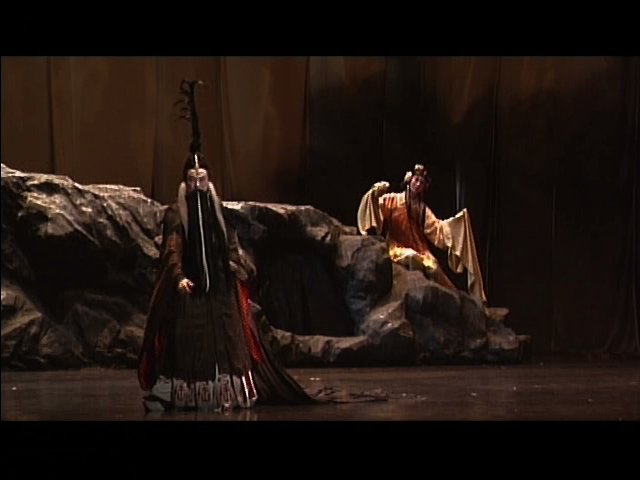
July 27, 2021, by Peter Kirwan
The Tempest (Contemporary Legend Theatre)
Tsui Hark’s spectacular, operatic Tempest, co-directed with Wu Hsing-kuo (who also plays Prospero), is a mesmerising take on Shakespeare’s play. Available on the MIT Global Shakespeares site, and made available in its 2004 incarnation to delegates at the 2021 World Shakespeare Congress, it’s an extraordinary show of power as a truly magical Prospero co-ordinates an army of spirits and special effects to achieve his ends. Yet these ends – particularly given that Prospero is the literal director of the production – are as much for entertainment as for revenge, in a production that delights in visual and aural pleasure.
Drawing heavily on traditions of Beijing and Kun Opera, this Taiwanese production offers a celebration of traditional art forms whose tone is primarily joyful. The stylised acting privileges gesture – a recurrent early motif, for instance, is the long-sleeved Miranda (Liu Chia-hou) ostentatiously wiping tears from her eyes as she listens to the story of how she and her father came to the island – and the formal songs reconfigure the characters’ insights as set pieces. The Tempest, with its long sequences of exposition and its pageantry, is perfectly suited to this style, with each character taking their turn to come to the fore and sing about their own experience, before ceding the stage to the next singer.
Prospero, with long prosthetic beard and decked out as a powerful sorcerer, oversees the songs. It’s interesting to see so inscrutable a Prospero, and one whose power is absolute. When Ferdinand (Sheng Chien) tries to resist Prospero’s capture of him, Prospero casually dodges his sword swings (Prospero as Neo!) before grabbing the sword with his bare hand and leaving Ferdinand flailing helplessly. Elsewhere, Prospero’s troop of spirits fills the stage with willing servants. For those who wish to resist Prospero, the edifice of power he represents is intimidating. And yet the artisinal quality of Prospero’s creations speaks to a fundamentally benign ruler. He’s hard, but he’s not dangerous.
Prospero’s power is mitigated somewhat by the production’s comedy. Yang Ching-ming’s Caliban, in particular, is an amusing highlight. Dressed and made-up as an Indigeneous Taiwanese man, Caliban offers a down-to-earth counterpoint to the high art represented by Prospero and by Chu Seng-li’s Ariel. His deep tenor voice and simpler melodies contrast with the high and complex notes struck by Ariel and Miranda, and their light-coloured clothes, flowing sleeves (and high wings, in Ariel’s case) are offset by his earth-coloured rags. But while Caliban complains about his state, he’s a fundamentally comic character. He particularly delights in Ferdinand’s imprisonment, taking the warningsand threats given him by Prospero and visiting them himself upon Ferdinand. But what’s also interesting is that Caliban is aligned with Ariel as well as contrasted with her. Ariel speaks up against Prospero during Ferdinand’s imprisonment, confirming that all Ferdinand and Miranda did on the beach was hold hands. Prospero may be powerful, but both Caliban and Ariel are able to speak back to him – within limits.
The display of power is impressive, and the high-budget production packs in no end of spectacular effects, from Ariel rising up in glory in front of the nobles as they are shipwrecked, elevated high above their heads, to the drapes that represent the stormy sea, to the large-scale reimagining of the wedding masque. The individual skills of the performers are also a key part of the visual variety here, including Stefano and Trinculo’s clowning, some jaw-dropping fast somersaulting by Caliban during his expressions of freedom, and the extraordinarily skilful sequence in which Ariel catches and returns a volley of thrown spears with her feet. And while I’m not qualified to appraise it, the singing and music are the real draw, with intricately woven melodies for the exposition and often poignant counter-melodies as characters respond, with spoken word retained to divide the set-pieces.
The production’s most significant choice is to have Prospero finally act as the bridge to unite Caliban and Ariel. Caliban is shocked to hear Prospero praise him in the same terms as he praises Ariel, and Caliban explains that they are two parts of nature which must work in harmony, before freeing them both. Ariel rides off on Caliban’s shoulders, the two joined. On the one hand, this seems to present Prospero as a sorcerer with an ultimately benign purpose, restoring and healing nature through his authoritarian rule. On the other hand, particularly with Caliban seemingly coded as Indigenous Taiwanese while Ariel seems to represent Chinese high culture (I may well be mis-reading this), there may have been a political underpinning concerning the union of Taiwan and China, and I’m not literate enough either in the aesthetics or in the politics to tell if that was intended. Either way, the production offers a hopeful take on the strong-man ruler, seeming to imply the potential of power to forgive and to effect reconciliation.
No comments yet, fill out a comment to be the first

Leave a Reply